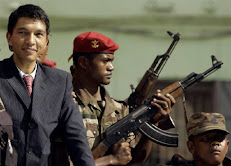How a Coup Has Forsaken Natural Beauty
Last month, a 34-year-old former deejay made international headlines by seizing the presidency of Madagascar in a swift coup. Despite an illegal transfer of power in which the military overthrew a democratically elected government, the image of baby-faced Andry Rajoelina disarmed many would-be critics. His unlikely story, from doing the Antananarivo nightlife circuit to starting his own radio enterprise, using his entrepreneurial skills as a launch pad for winning a mayoral race, and then finally, toppling the Malagasy government, endeared the charismatic upstart to the world community.
To most, familiarity with Madagascar is limited to the 2005 animated film about a zebra and a lion. Unbeknownst to many is that Madagascar is home to one of the world’s richest biological havens, lush with innumerable plant and animal species non-existent beyond the island. The balance that preserves this precious dynamic is extremely sensitive and has long required government protection from raiders looking to exploit the forest’s resources.
Madagascar’s political upheaval has severely disrupted this fragile dynamic. In the aftermath of the coup, the security sector has been paralyzed by urban chaos and street protests. With manpower needed in the capital to protect Rajoelina’s regime, the parks and forests have been abandoned. Capitalizing on the central government’s vulnerability, criminal gangs have poured in to the Malagasy rainforests seeking plunder:
“Organized by foreign businessmen, hundreds of illegal loggers and animal traders have overwhelmed the weak (defenses) of the country's national parks, stripping the forests of precious rosewood and ebony, smuggling out rare animals and destroying the habitat of endangered wildlife.”
With no one to stop it, exploitation has developed into a well-oiled machine, with an apparatus of coercion and bribery:
“The looters are so well organized that they built a road six kilometres into one of the most remote parks in the north, sent a flotilla of ships to smuggle out the logs and recruited workers with radio commercials, environmentalists say.”
Those park rangers who dare to confront the menace are often chased away by the armed militias that accompany looters. But of course, fathoming confrontation is rare in the first place:
“The gangs have paid customs officers to turn a blind eye to the large-scale export of illegally cut wood. And they have sent a fleet of small boats to land on the wild coastline, bypassing the ports.”
The illegal exploitation of Madagascar’s resources is being fueled by a massive demand, particularly in China, for rosewood and ebony, both valued highly on the world market. Exactly who is behind the looting cannot be determined. One local speculates it has been “organized by Chinese businessmen,… although he was uncertain whether they are from China or are ethnic Chinese from a country such as Malaysia or Singapore.”
In a country where most earn less than $1 a day, the Malagasy people are no stranger to hardship. Since gaining independence from France in 1960, coups and military dictatorships have been the norm for the world’s fourth largest island. The latest conflict however has delivered the Malagasy people a terrible blow. Industries from tourism to dairy have been crippled, and squalor has been exacerbated by “strikes, wage shortages and a cutoff in aid supplies from many foreign donors.”
The impending environmental and humanitarian tragedy can only be avoided by genuine efforts from the international community, an altogether unlikely prospect.
Read the original report by Globe and Mail here.
I'd also recommend checking out an African perspective on the political developments in Madagascar.
A traveler to Madagascar shares his dismay.
Watch the video below to get a sense of the enigmatic Rajoelina's personality and the turbulence in Madagascar:
And finally, experience the beauty that is perishing before our very eyes in this video.
Monday, April 20, 2009
Subscribe to:
Post Comments (Atom)











































No comments:
Post a Comment